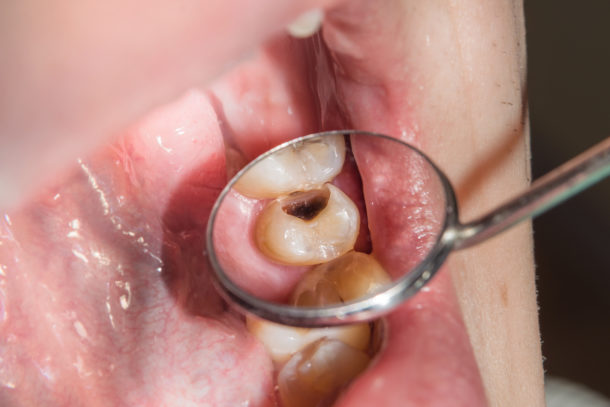Approximately 91% of Americans over 20 years of age have experienced cavities at some point. Additionally, nearly 30% of Americans over 20 have untreated cavities. These statistics are staggering, especially considering that people can avoid most cavities with proper preventive care. So, how does a cavity actually start?

The Formation of Cavities
The Role of Enamel
Enamel, the strongest substance in the human body, covers the outer layer of a tooth. However, acid can erode this protective layer. When we consume sugary foods, cavity-causing bacteria in our mouths also feed on the sugar.
These bacteria produce acid as a byproduct, which gradually wears away the enamel and creates a cavity. This process highlights the importance of removing as much plaque as possible each day to prevent cavities.
Risk Factors for Cavity Development
Several factors increase the risk of developing cavities, including:
- A High-Sugar Diet
- Xerostomia (Dry Mouth)
- Low Exposure to Fluoride
- Frequent Snacking
- GERD
- History of Cavities
- Eating Disorders
- Lack of Dental Care

Stages of Cavity Development
Early Stages: Demineralization
A cavity often begins with a hyper-white and chalky or brown appearance, known as demineralization. At this stage, before a true cavity forms, increased fluoride exposure and good home care can remineralize the enamel.
Advanced Stages: Dentin and Pulp Involvement
Once the cavity progresses through the enamel and into the softer layer of the tooth (dentin), it becomes irreversible and progresses more quickly. If left untreated, the decay will eventually reach the pulp chamber, where the nerve and blood vessels reside. At this point, a root canal becomes necessary to save the tooth, followed by a crown to provide strength and prevent fracturing.
Prevention and Early Detection
While most people have experienced cavity fillings, identifying your risk factors with your dentist and hygienist can help formulate a plan to prevent future cavities. If you notice any signs of a cavity, contact your dentist immediately. Early treatment improves the prognosis and allows for the determination of steps to prevent new cavities from developing.
References
Mouth Healthy: https://www.mouthhealthy.org/en/dental-care-concerns/how-do-we-prevent-cavities
National Institute of Dental and Craniofacial Research:
https://www.nidcr.nih.gov/health-info/tooth-decay/more-info/tooth-decay-process
American Dental Association:
https://www.mouthhealthy.org/all-topics-a-z/cavities
